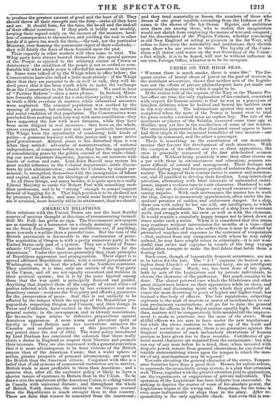AMERICAN RELATIONS.
OUR relations with the United States are not the least fruitful sources of anxious thought at this time of recommencing turmoil. Still Mr. Polk has given no sign. The Government newspapers are as unsteady as a barometer on a cloudy morning or rumours on the Stock Exchange. Their last oscillations are, if anything, more towards a warlike than a peaceful tone. But the tone of the British provincials is favourable to the continuance of peace. The acquisition of Oregon is with a pretty numerous party in the United States only part of a system. They are a kind of Trans- atlantic O'Connellites ; their maxim being " America for the Americans." Under this specious generality they cloak principles of Republican aggression and propagandism. Their object is to spread affiliated Republican states, with a central government at Washington, over at least the whole of the Northern continent. They constitute, it is true, only one section of the War party in the Union, and all are not equally consistent and reckless in their political system; but it is by the more bigoted among them that the war spirit is principally fostered and guided. Anything that deprives them of the support of casual allies—of parties infected with the war mania by less extensive and more transitory causes—weakens the War party and affords a guarantee for the preservation of peace. And this is not unlikely to be affected by the temper which the sayings of the Republican pro- pagandists respecting Oregon and Canada, and their doings in Texas and California, have excited in the British provinces. In general society, in the newspapers, and in literary associations, the favourite topic relates to defensive preparations against American aggression. A more warm and prevalent spirit of loyalty to Great Britain and her institutions animates the Canadas and seabord provinces at this juncture than in any period since the war of 1812. The wiser policy introduced by Lord Durham has convinced the colonists that there really exists a desire in England to respect their liberties and promote their interests. They are also impressed with a general conviction that it is more advantageous to be born citizens of the British empire than of the American Union ; that a wider sphere of action, greater prospects of personal advancement, are open to the British than the American citizen. Conjoined with this is a belief that if old systems of commercial restriction are to survive, British trade is more profitable to them than American ; and a surmise that, after all, the exclusive policy is likely to have a shorter tenure of existence in Britain than in the Union. To be drawn into the maelstrom of the American Union, is a thing viewed in Canada with universal distaste ; and throughout the whole of British North America, the anxiety to see Oregon rescued from the Republicans is much stronger than in this country. These are facts that cannot be concealed from the Americans; and they tend materially to lessen the numbers of those who dream of one great republic extending from the Isthmus of Pa- nama to the shores of the Icy Ocean. Bigoted and ambitious men there are among them, who to realize this imagination would not shrink from employing the means of war and conquest ; but the descendants of the Pilgrim Fathers, whether remaining in old New England or acting as pioneers in the far West, will refuse to force even the nationality and institutions they cherish upon those who are averse to them. The loyalty of the Cana- dians will throw cold water on the war fever-heat of the Union : a fact which, it is to be hoped, will not be without influence in our own Foreign Office, whoever is to be its occupant.


























 Previous page
Previous page